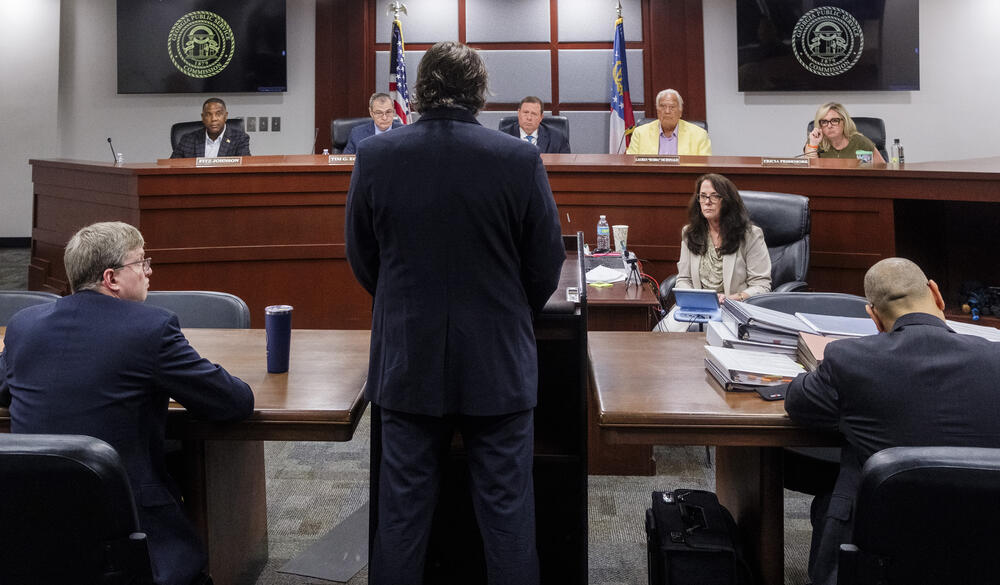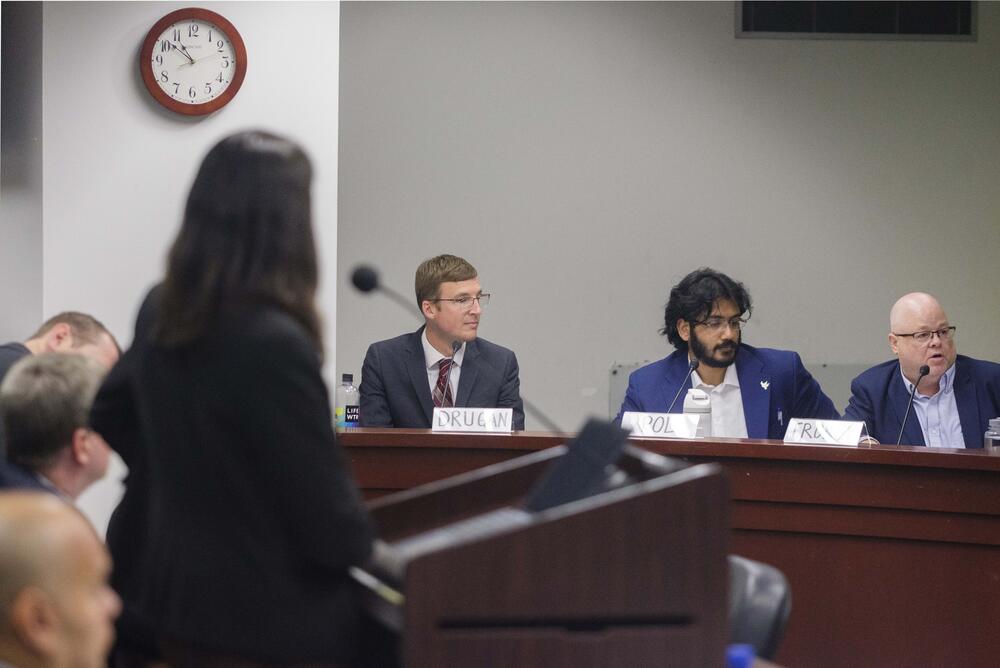
Caption
The five member Georgia Public Service Commission during the start of public hearings on Georgia Power’s 2025 Integrated Resource Plan Tuesday, May 27, 2025 in Atlanta.
Credit: Grant Blankenship/GPB
|Updated: May 28, 2025 4:55 PM
GPB's Grant Blankenship reports on the negotiations surrounding Georgia Power's plans for generating new power to support data centers and artificial intelligence.

The five member Georgia Public Service Commission during the start of public hearings on Georgia Power’s 2025 Integrated Resource Plan Tuesday, May 27, 2025 in Atlanta.
State-mandated negotiations over how Georgia Power will generate electricity in the future have begun. At stake is how the utility will manage its forecast for an explosive demand for power or keep carbon-emitting power generation for what might turn out to be an artificial intelligence bubble.
Georgia Power expects 25% more power demand by 2030 as compared with figures in the last Integrated Resource Plan (IRP) approved by Georgia’s Public Service Commission two years ago. That’s largely due to an expected growth of data centers.
The utility proposes to hedge against its predicted demand by postponing the end of coal generation and adding new fossil gas power plants. Environmental advocates warn that would add carbon emissions when climate change means we should instead be cutting them.
At the same time, the company says much of the projected growth is also based on so-called trade secrets — essentially the names, possible locations and theoretical power needs of upcoming data center projects which, for now, Georgia Power want to keep to itself.
In testimony to the Public Service Commission, the PSC’s own staff experts said that even considering the known pipeline for data center and cryptocurrency growth and what they know about Georgia Power’s “trade secret” pipeline, the Georgia Power predictions are off base.
“We conclude that the forecast produced by Georgia Power is likely skewed to show load realization sooner and in greater quantity than is likely to materialize,” said Robert Trokey, director of the Public Service Commission’s electric unit at the hearing Tuesday.
Trokey and others said Georgia Power should stop using different statistical models (one based on history, the other trying to predict the future) for estimating load growth for conventional industry versus tech companies. The variation they said, leads to a pattern of Georgia Power overestimating their future needs and adding too many generation resources.
PSC staff continues to recommend Georgia Power revise down its projections by 2,176 megawatts through 2044. That’s a generation capacity over twice the potential of the remaining units online at the company’s Plant Scherer in Monroe County, which, along with Plant Bowen in Bartow County, the company would like to keep running well past what most environmental advocates, including most of those in the public comment period of the Tuesday hearing, have said is acceptable.

From right, Robert Trokey, member of the Georgia Public Service Commission’s professional staff, Karan Pol and Dylan Drugan, both of Daymark Energy Consultants all testified that Georgia Power’s estimate of its future generation needs for data centers and crypto currency was an overestimate.
But the coal-fired plants have their boosters, especially among next-door neighbors.
Monroe County Commissioner Eddie Rowland spoke earlier during public comment to remind the PSC just how important Plant Scherer is to the economic health of his community.
Rowland described $11 million in tax funds annually, some 40% of the entire county budget. Rowland said despite the environmental cost of operating the coal-fired power plant, losing Scherer tomorrow would be a massive wound to his community.
“We would love to have a completely clean community, and we work towards that in a variety of ways,” Rowland said. “But we also have to pay our bills, so we're trying to kind of balance both.”
Rowland pointed to a new fossil-fuel-driven generation plant expected to power a data center as a way his community is trying to wean itself from coal. Meanwhile, most of the other people who took part in public comment urged the PSC to move Georgia Power away from fossil fuels, as public commenters almost always do in such proceedings.

A person holds her written comment before her chance to speak during the public comment section of the Georgia Public Service Commission’s first day of hearings on Georgia Power’s new plan for electricity generation.
PSC member Tricia Pridemore aggressively questioned the staff's conclusions that Georgia Power wouldn’t need to hold onto what amounted to one large plant’s generation capacity, suggesting their findings were tantamount to being opposed to economic progress. Representing Georgia Power in cross examination of the PSC staff, attorney Brandon Marzo of the firm Troutman Pepper Locke took the same tack.
“If your recommendation is adopted, and the company doesn't have capacity enough to reliably serve load, you are all but assuring an economic slowdown for Georgia, correct?” Marzo asked.
Karan Pol, consulant from Daymark Energy Advisors, fielded that one for PSC staff.
“That seems — speculative,” Pol answered.
Meanwhile, existing customers (including Walmart) and other environmental groups have already filed testimony, which each will present later in the IRP hearings, aimed at decreasing reliance on fossil fuels through an expansion of what’s now a pilot program called Solar Plus. In it, Georgia Power buys electricity from privately owned solar generation and connected batteries. The company is already pursuing its own utility scale grid connected battery storage, called BESS, to better use its own solar generation.
The hearings, which run at least through May 31, also coincide with the start of voting in two Public Service Commission seats. Voting in those races begins Tuesday and ends on June 17.
An earlier version of this story misspelled the last name of Monroe County Commissioner Eddie Rowland.